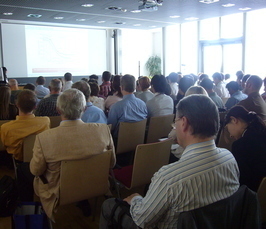CANCELLED: MPI Colloquia: Towards Digital Biology
Kolloquium
- Date: May 24, 2016
- Time: 04:00 PM - 06:00 PM (Local Time Germany)
- Speaker: Prof. Gene Myers, Director at Max Planck Institute for Molecular Cell Biology and Genetics in Dresden.
- Location: Max Planck Institute Magdeburg
- Room: Big Seminar Room "Prigogine"
- Host: Max Planck Institute Magdeburg

PLEASE NOTE: This presentation had to be cancelled due to illness of the speaker. (Update 13th May 2016)
This presentation is part of the MPI Magdeburg colloquium series. Everyone interested in this presentation is very warmly invited to come.
Prof. Dr. Eugene W. Myers is Director and Klaus Tschira Chair for Systems Biologie at Max Planck Institute for Molecular Cell Biology and Genetics in Dresden.
Abstract Prof. Gene Myers
Towards Digital Biology
Our group has been actively pursuing the idea that with great microscopes and great informatics we will be able to truly digitize models of cells, tissues, and organisms through time with information about the genetic and proteomic states of each cell layered there on. The belief is that these atlases combined with optical observations of labeled entities will accelerate the life sciences by allowing us to visualize these systems from any vantage point and as a system, thus leading to many discoveries such as the nature of the genetic control of fly wing development.
Since arriving in Dresden three years ago we have made significant progress on hard segmentation and tracking problems with the use of AI techniques developed in the computer vision community. We will present several examples of current projects aimed at digitizing light microscope data sets that exemplify various such techniques and present the quality of the results we obtain with them.
Despite these improvements we still find ourselves at the limit of what can be extracted from the images because of limited resolution and contrast. Fortunately, advances in microscope componentry such as adaptive optics, spatial light modulators, and ultra high-speed cameras present opportunities for improving the underlying imagery. We will report on two microscope development projects in our lab, where the aim is to improve resolution by making multiple observations of a volume and from them computing a better reconstruction of the object under observation. We think better microscopy through computation and dynamic onboard control of acquisitions is an emerging trend that we generally call computational optics.